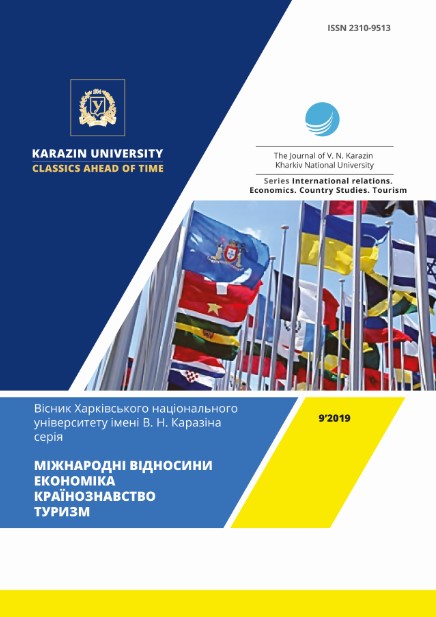Оптимізація оподаткування фізичних осіб в національній економіці України: методологічний інструментарій
Анотація
Механізм посилення ефективності оподаткування доходу фізичних осіб неможливий без існування комплексу методів та моделей його підтримки та організаційних заходів, спрямованих на його реалізацію. В умовах флуктуацій зовнішнього середовища та нестабільності національної економіки важливим є реалізація функцій оподаткування, що забезпечить не тільки ефективність розробленого механізму, а і його соціальну справедливість та прозорість. Метою статті є дослідження та формування методологічного інструментарію розробки механізму посилення ефективності оподаткування фізичних осіб в національній економіці України. Методи дослідження: поєднання методів аналізу часових рядів, спектрального аналізу, кластерного аналізу, інвестиційного аналізу та сценарного підходу дозволяє здійснити прогнозування податкових надходжень та прослідити їх вплив на національну економіку, кластерного методу для дослідження ефективності функціонування податкової системи на підставі використання методу к-середніх. Результати: сформовано методологічний інструментарій забезпечення механізму посилення ефективності оподаткування доходу фізичних осіб, який містить методичний підхід до визначення ефективної податкової ставки, моделі прогнозування податкових надходжень та активізації економічної діяльності країни, кластерні моделі податкового адміністрування що дозволяє розробити ефективну податкову політику. Запропоновано три сценарію розвитку податкової системи національної економіки: стандартний, оптимістичний та песимістичний, які базується на розрахунках крапкового та інтервального прогнозів. Висновки: розроблений методичний підхід щодо побудови ефективної податкової ставки для оподаткування доходів з фізичних осіб враховує субсидування та отримання надлишкового доходу елементів та дозволяє здійснити формування ефективної податкової політики задля збільшення податкових надходжень.
Завантаження
Посилання
Vito T. (2018) Pravitel'stvo i rynki: menyayushchayasya ekonomicheskaya rol' gosudarstva [Government and markets: the changing economic role of the state]. M.: Izd-vo Instituta Gaydara. (in Russian)
Burgess R., Stern N. (1993) Taxation and Development. Journal of Economic Literature, vol. 31 no. № 2, 762-830.
Gordon R., Li W. Tax structures in developing countries: Many puzzles and a possible explanation. Journal of Public Economics, 2009, vol. 93, no. 7-8, 855-866.
Kleven H. J., Kreiner C., Saez E. (2009) The Optimal Income Taxation of Couples. Econometrica, vol. 77, no. 2, 537-560.
Jha, Raghbendra. (2008). International Handbook of Development Economics, Edward Elgar Publishing, Incorporated, chap. 55, vol. 1.
Babenko V., Kulczyk Z., Perevozova I., Syniavska O., Davydova O. (2019) Factors of Development of International e-Commerce in the Context of Globalization. CEUR Workshop Proceedings, vol. 2422, 345-356. Available at: http://ceur-ws.org/Vol-2422/paper28.pdf (accessed 01 November 2019)
Babenko V.A., Sidorov V.I., Savin R.S. (2018) Activities of international agroholdings in the world market of foreign investment: investigation of trends and factors of impact in current financing conditions. Technology audit and production reserves, 2018, no. 4/4(42), 18-24. DOI: 10.15587/2312-8372.2018.141135
Piketty T. (2014) Capital in the 21st Century. Cambridge: Harvard University Press.
Perevozova I., Babenko V., Kondur O., Krykhovetska Z. and Daliak N. (2019) Financial support for the competitiveness of employees in the mining industry. SHS Web of Conferences, vol. 65, 1-6. DOI: https://doi.org/10.1051/shsconf/20196501001
Besley T. and Persson T. (2013) Taxation and Development. Handbook of Public Economics, vol. 5, 471-474.
Todaro M., Smith S. (2014) Economic Development, 12th Edition. Pearson.
Babenko, V., Alisejko, E., Kochuyeva, Z. (2017). The task of minimax adaptive management of innovative processes at an enterprise with risk assessment. Innovative technologies and scientific solutions for industries, No. 1 (1). DOI: https://doi.org/10.30837/2522-9818.2017.1.006
Lomaka J. A. (2018) Zarubіzhnikh dosvіd reformuvannya podatkovikh sistem ekonomіchno rozvinutikh kraїn svіtu [Foreign experience in reforming the tax systems of economically developed countries in the world]. Ukraїns'kiy zhurnal prikladnoї ekonomіki, vol. 3, no. 4, 317–324. (in Ukrainian)
Perevozova I., Daliak N., Babenko V. (2019) Modeling of Financial Support for the Competitiveness of Employees in the Mining Industry. CEUR Workshop Proceedings, no. 2422, 444-454. Available at: http://ceur-ws.org/Vol-2422/paper36.pdf (accessed 19 October 2019)
Babenko V., Kulczyk Z., Perevosova I., Syniavska O. and Davydova O. (2019) Factors of the development of international e-commerce under the conditions of globalization. SHS Web of Conferences, vol. 65, 10-16. DOI: https://doi.org/10.1051/shsconf/20196504016
Автори, які публікуються у цьому журналі, погоджуються з наступними умовами:
- Автори залишають за собою право на авторство своєї роботи та передають журналу право першої публікації цієї роботи на умовах ліцензії Creative Commons Attribution License 4.0 International (CC BY 4.0), котра дозволяє іншим особам вільно розповсюджувати опубліковану роботу з обов'язковим посиланням на авторів оригінальної роботи та першу публікацію роботи у цьому журналі.
- Автори мають право укладати самостійні додаткові угоди щодо неексклюзивного розповсюдження роботи у тому вигляді, в якому вона була опублікована цим журналом (наприклад, розміщувати роботу в електронному сховищі установи або публікувати у складі монографії), за умови збереження посилання на першу публікацію роботи у цьому журналі.
- Політика журналу дозволяє і заохочує розміщення авторами в мережі Інтернет (наприклад, у сховищах установ або на особистих веб-сайтах) рукопису роботи, як до подання цього рукопису до редакції, так і під час його редакційного опрацювання, оскільки це сприяє виникненню продуктивної наукової дискусії та позитивно позначається на оперативності та динаміці цитування опублікованої роботи (див. The Effect of Open Access).




